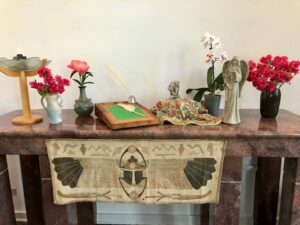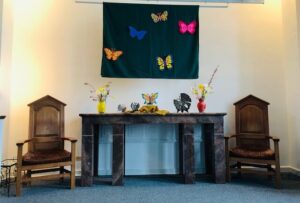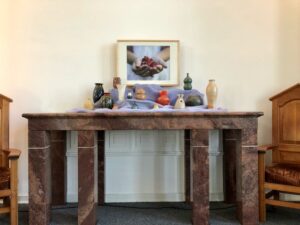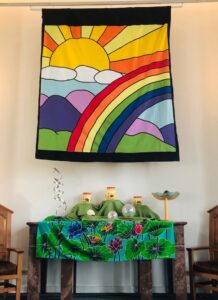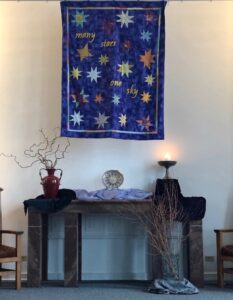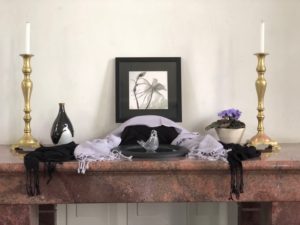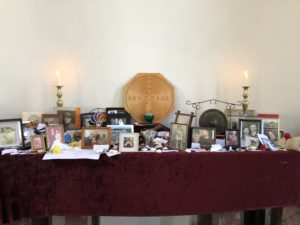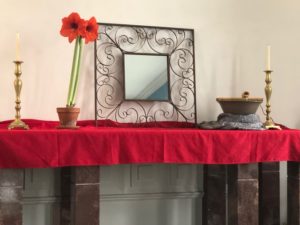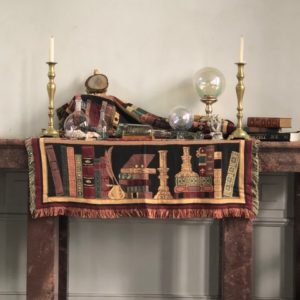“Waiting and Hope”
Rev. Tim Temerson and Tori Goodloe
In the Christian tradition, Advent is a time of anticipation and waiting. This morning’s service will consider the spirituality of waiting and the connection between waiting and hope. Today marks the beginning of the Christian season of Advent.
Text of the Sermon
Rev. Tim Temerson
I hope all of you had a wonderful and joyful Thanksgiving holiday. The Temersons traveled to coastal Virginia to spend time with our son, daughter-in-law, and her family. What a blessing it is to relax, to be with those we love, and to live, even for a couple of days, at a different pace.
It is also very good to be back in the loving arms of this wonderful community. These last weeks have certainly been painful with the tragedy at UVA and the other mass shootings that seem to take place on a daily basis. There is so much loss, so much pain, and so much trauma. I keep waiting for things to change, for the world to return to some semblance of normalcy, and for the human family to begin to find a way to get along. But, I’m sorry to say, the waiting shows no signs of ending and there feels as if there is little reason to hope things will get better.
I want to share a few thoughts with you this morning about waiting and the connection between waiting and finding hope. Waiting and hope are key aspects of the Season of Advent, which, as we observed earlier, begins today.
As I understand it, the word “advent” literally means “the beginning of” or “ the coming of,” as in the coming of something new, something important, something meaningful. In the Christian tradition, Advent is really about two comings, both of which are connected to Jesus of Nazareth. The first took place over 2,000 years ago when a tiny babe was born in a manger in Bethlehem. The second has not yet occurred, and refers to the coming of the resurrected Jesus who, many Christians believe, will return at the end of time.
Now I think it’s fair to say that we Unitarian Universalists are pretty comfortable thinking and talking about the first coming of Jesus, meaning the coming of the human being called Jesus of Nazareth who lived and preached a message of love, compassion, and welcome for all people, including and especially those who are marginalized, reviled, and rejected. That’s the Jesus I will preach about on Christmas Eve and it’s a Jesus in whom many Unitarian Universalists, myself included, find wisdom, truth and inspiration.
While the first coming of Jesus the teacher and preacher has always played an important role in Unitarian Universalism, the Second Coming has been, and still is, a bit more challenging and I would even say problematic for many Unitarian Universalists. For those who may be new to our faith, we UUs embrace the use of reason and science in our spiritual lives, we see ultimate reality as an unfolding mystery rather than a certainty set in stone, and we draw wisdom from many religious traditions rather than privileging one tradition over all others. So I think it’s fair to say that belief in a “second coming” that would be contrary to reason and the laws of nature and that would privilege one religion, one theology, and one sacred story over all others strikes, at least a fair number of UUs, as being hard to believe or comprehend.
Given these questions and perhaps even doubts about a second coming, where does that leave Unitarian Universalism when it comes to a time like Advent? Should we simply focus on the tiny baby in the manger or perhaps ignore Advent altogether? Or can we find a deeper meaning or a different meaning during this time of year? I want to try and make the case that there is a great deal we UUs can learn from Advent and what we can learn has everything to do with what I’m going to call the “spirituality of waiting.”
Now, before I delve into what I mean by the spirituality of waiting, let me offer two caveats. First, there is little that is spiritual about certain kinds of waiting. Think for a moment about the UVA community two Sunday nights ago and what many of our children too often face while at school. I cannot begin to imagine the stress and anxiety of waiting during a shelter- in-place order and how fearful that was not only for those on Grounds but also for their loved ones. Or consider the waiting that most of us have had to face at one time or another when we or a loved one has to wait for a medical diagnosis or the results of a battery of tests or scans. I dealt with that stress some years ago and I can say that this kind of waiting was the farthest thing from spiritual I can imagine. And as much as we try to breathe through the fear and uncertainty, waiting to find out if our children are safe or if our lives are about to be changed forever is so incredibly hard and I don’t see anything to recommend or celebrate about that kind of waiting.
There’s also another kind of waiting that the world would be far better off without. That’s the unconscionable waiting for justice and liberation those who are marginalized and oppressed are forced to endure every day. As a lifelong beneficiary of white, male privilege, I cannot begin to imagine what it’s like to be discriminated against and treated as less than because of the color of my skin, my gender, my sexual orientation, my immigration status, my age, my physical abilities, my economic situation, or one of the many other categories that are used to confer privilege on some while demeaning and dispossessing others. There is nothing noble or admirable about waiting for justice and fairness and that’s why Dr. King titled one of his most famous books “Why We Can’t Wait.”
By now you’re probably thinking that I’ve changed my mind and that I’m going to preach a sermon against this whole concept of waiting. And I must say that waiting has never been something that I’m very good at. Patience has never been one of my virtues and my go to place is to move on or keep going rather than having the patience to stay put and to wait. Just ask anyone who has ever been with me when I’m looking for a spot in a crowded parking lot. I’d almost rather have a root canal than to patiently circle a crowded parking lot waiting for a space to open up.
But as I’ve reflected more on my own spiritual journey and especially on those moments when I’ve slowed down, when I’ve stopped the mad dash for a parking spot or the rush to get everything on my endless to do list done – in those moments when I do find myself simply waiting and being present rather than rushing and doing more, something inside me begins to shift. It’s not that I’m necessarily waiting for a specific thing to get done or a goal to be accomplished. Rather, I’m just waiting and listening – waiting for the universe or my own heart or perhaps the spirit of life to speak, to teach, to take me to a place of depth and sometimes discomfort, and to bring me to a new, deeper sense of understanding and peace. It is this kind of waiting – waiting as listening, waiting as learning, waiting as being open to beginning anew – it is this kind of waiting I want to explore with you today.
As I said before, waiting has never been easy for me and impatience and hurry are my go to places. In fact, in order to experience the kind of waiting I described a minute ago – the waiting that breaks through the stress, the distraction, and the impatience so that we can truly listen and grow – that kind of waiting is something I have often found at particular times and in special places and I’d like to tell you about one of those times when I waited until I found my way to a place of connection and peace and healing – a place that enabled me to put much of the fear and stress of life behind me and that opened my heart to love, peace, and hope.
This particular experience took place some years ago when I was on a retreat at a monastery called the Abbey at Gethsemane, which is located in Kentucky about half-way between Louisville and Lexington. The monks at Gethsemani are Trappists, which is one of the most austere and strict monastic orders. Silence is observed day and night and the monks only speak when it is necessary for their work or when they are observing “the Daily Office,” which is the regimen of eight prayer services they participate in every day.
I think it’s fair to say that as hard as waiting is for me, silence has been even harder because most of the time I’m addicted to noise and distraction. But while I’ve always found silence to be challenging, something inside me keeps seeking it out. I find myself drawn to places like monasteries where I become part of a completely different world and way of life – a way of life in which I’m required to wait and listen, wait and listen, wait and listen.
A number of years before my visit to Gethsemani I had spent a week on retreat at another monastery that also observed extended periods of silence. I kept a journal that week and it is filled with my struggles with waiting and listening. I expressed my impatience with waiting for something to happen or about having some kind of transcendent moment or deep spiritual experience. I guess I thought that being at a monastery was supposed to open some special gateway to God or Nirvana but what I was experiencing was the same old Tim, lost and uncertain about what to do without all the noise and busyness to distract him.
But as time went on that week, something began to change. Those anxious and impatient voices I kept hearing were transformed into something kinder and more compassionate. The pages of my journal began to fill with understanding and gentleness, rather than judgment and condemnation. What I ultimately heard that week was a voice telling me “Even though you’re imperfect, flawed, and more often than not a total mess, in spite of all that, you’re ok, you’re acceptable – your worthy of receiving and giving love.
And what was so astonishing about that retreat was that although waiting in silence for something had taken me to a challenging place – a place where my feelings of being spiritually inadequate were exposed – the waiting and the silence didn’t leave me there. Instead, waiting in the silence created a space in my life where something did happen – compassion and understanding.
And something similar happened that week at Gethsemani. I arrived at the monastery during a pretty stressful time in my life and I was hoping the retreat would bring me some kind of calm and comfort. I wish I could tell you that unlike my previous experience with silence, something clicked and I immediately went to that place of love and compassion, peace and feeling centered. But the more I wrote in my journal about my need to move beyond fear and anxiety, the stronger and more painful it got. I kept waiting for that voice of love and compassion to leap from the pages or to magically appear in my thoughts. But the voice remained silent and the fear persisted. At my lowest point that week, I began to wonder if I was destined to live the rest of my life this way.
But then, just as the fear was about to give up, something unexpected helped me find my way to hope and called me back to the ultimate goodness and blessings of my life. And that something was once again waiting, but in this case waiting in the darkness. And I’m not talking about emotional darkness or the “dark night of the soul,” although I was certainly experiencing both. Rather, what helped me find a place of healing and hope was actual, physical darkness that I was experiencing at the monastery.
I mentioned earlier that the monks engage in a regimen of regular prayer services that take place both during the day and at night. There is one service, called Compline, which occurs every night before the monks go to bed. Near the end of the service, all the lights in the Abbey are turned out and the only light one can see are two candles flickering at the far end of the sanctuary. After about a minute in darkness and silence, the Abbey bells chime several times. Then the monks resume chanting. After they complete the chant, the lights come back on and the service continues.
Although I can’t fully explain it, that minute of waiting in darkness and anticipating the coming of light brought me hope. Every night at that service I found myself waiting for the darkness and then waiting in the darkness. And what I experienced was not the kind of darkness that leaves us feeling afraid but rather darkness that felt like a warm, comforting blanket that made me feel safe and at home. And what I also found as I waited in the darkness was light – light that was faint and distant but o so beautiful – light that helped me remember that there is hope, that there is peace, and that there is love to be found in the darkness and even in the dark, scary places of life.
By the time the retreat was over I had a new relationship with the stress and anxiety I had been feeling. They were still with me because stress and anxiety are part of life. But since my experience of waiting and listening in the darkness, I think I’m more at peace with anxiety and fear, better able to talk about and confront it, and capable of reminding myself that in spite of the uncertainties of life, I am blessed with great love and great joy. Waiting in the darkness made me aware of just how blessed my life is and it gave me the peace of mind I needed to move on from fear so that I could live from a place of deep, deep gratitude.
And my experience with waiting and listening in the darkness leads me back to the waiting that is at the heart of Advent. You see, while we often characterize that waiting as anticipation for the physical return of Jesus at the end of time, I can’t help but feel that what the season is really calling for is a deep, spiritual connection to what Jesus of Nazareth shared with the world and with all of us – peace, love, hope, and joy. And I don’t think it’s a coincidence that the time Christians are invited to do this deep spiritual work happens to be the darkest time of the year.
And there’s one more thing I’d like to say about the power of waiting. The healing I experienced waiting in the darkness at the abbey reenergized me to work for justice and fairness and peace in a world that needs and is waiting for us – waiting for us to embody the kind of unconditional love and courage that Jesus of Nazareth used to challenge an unjust status quo.
Let me close with these words from our reading. “We are waiting. Waiting for a world which can know justice. Waiting for a lasting peace. Waiting for the bridge to span the divides which separate us. Waiting for a promise or a hope.
For all of this we are waiting.
Amen and Blessed Be
A family-friendly space to participate in worship
is available in the social hall.
All are welcome!
CLICK HERE for our covid safety protocols.
Sharing Joys and Sorrows
If you would like to have a joy or sorrow shared aloud in this week’s community worship service, please complete this form by 9AM Sunday morning.


